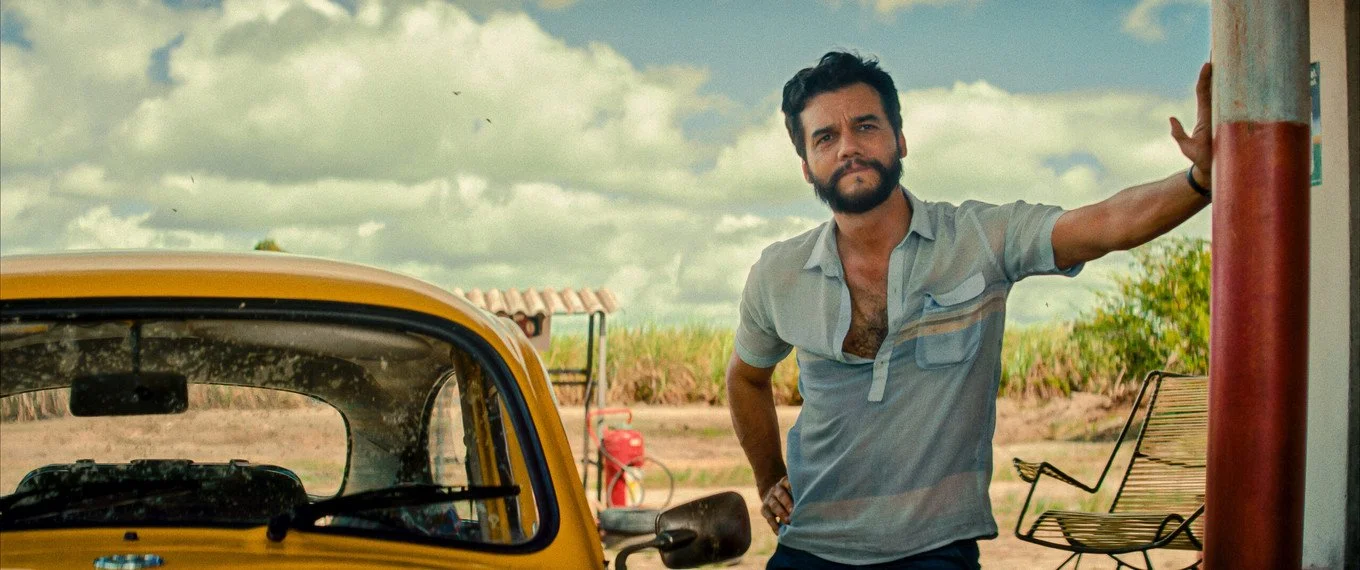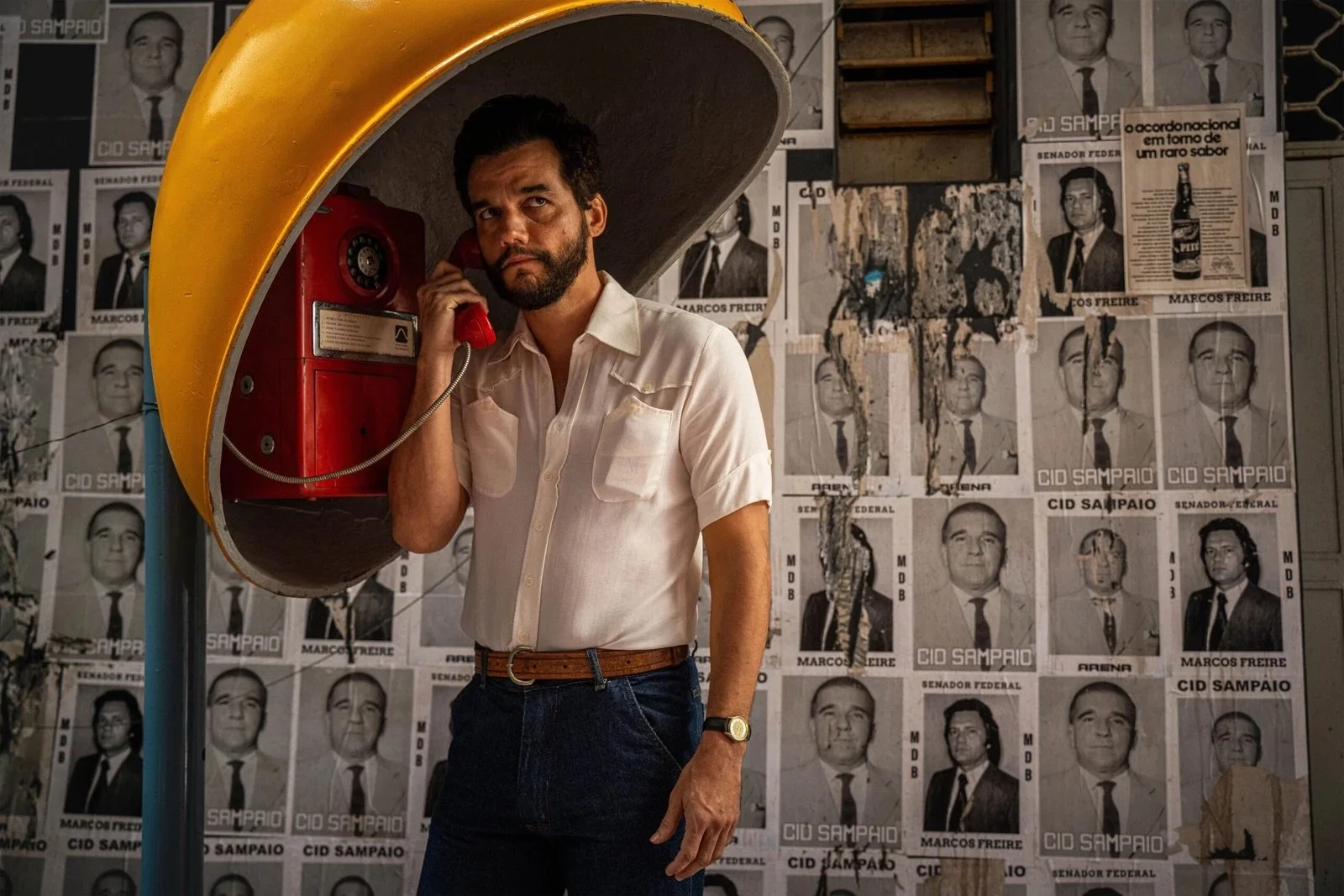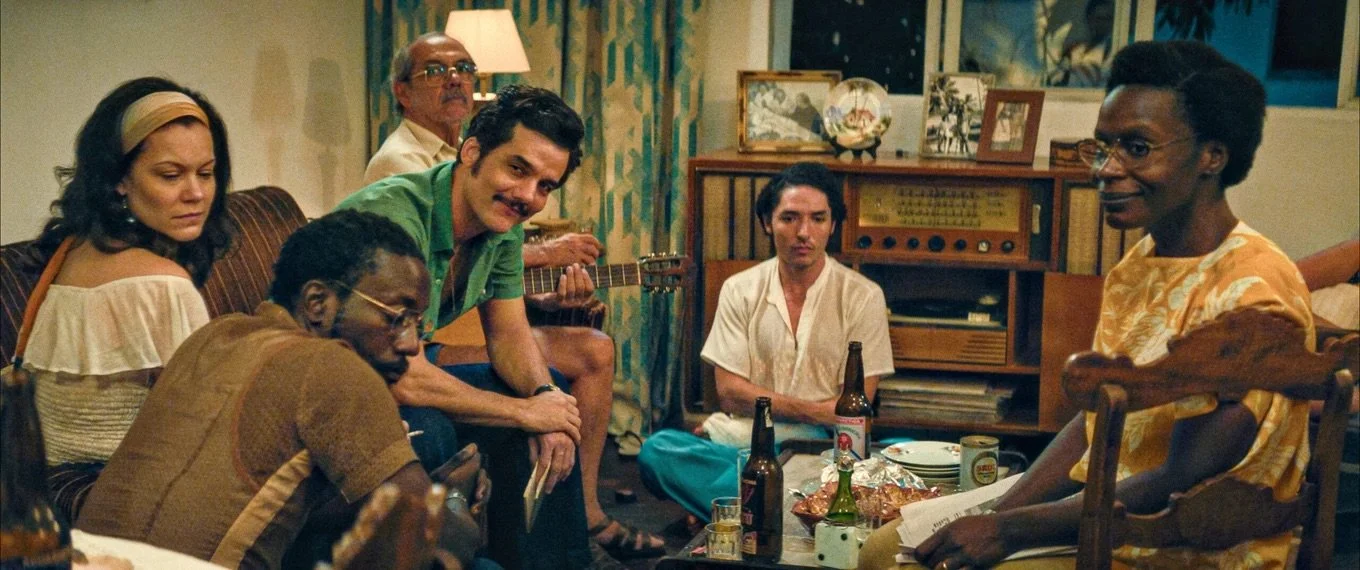'The Secret Agent' Review: Wagner Moura Stuns in a Political Thriller Brimming with Grit, Humor, and Heart
Wagner Moura in 'The Secret Agent' - Courtesy of NYFF / NEON
Take Pulp Fiction, throw it in a 1970s Brazilian police state. A magnetic lead in Wagner Moura—sets, costumes and performances with more style, more grit, and way more double-crosses. you'd get The Secret Agent.
There are films that come out of nowhere and demand your attention, and then there are films like The Secret Agent (O Agente Secreto), which don’t ask—they seize it with force, ferocity, and style. Directed by Kleber Mendonça Filho (Bacurau, Aquarius), this towering new political thriller is as furious as it is flamboyant, as mournful as it is mischievous, and as intimate as it is epic. It doesn’t just play with genre—it reinvents it. The result? One of the most original, courageous, and compelling cinematic statements of the year, led by a career-best Wagner Moura, who returns to Brazilian cinema with soul, swagger, and something urgent to say.
Set in Recife in 1977—a period when Brazil was still trapped under the boot of military dictatorship—the film follows Marcelo, a brilliant technology expert with a haunted past, who returns home in a desperate attempt to reunite with his young son and flee the country. But nothing in The Secret Agent unfolds simply. Hitmen are on his trail. Corrupt government officials have him in their crosshairs. And in classic Mendonça Filho fashion, the streets are alive with ghosts, music, history, myth, and menace. What begins as a man-on-the-run story soon reveals itself to be something far deeper: a requiem, a resistance, a riot of color and conscience.
From its very first frame, The Secret Agent makes its intentions known: this is not your standard cat-and-mouse thriller. It’s a fever dream draped in carnival banners and haunted by memory, genre, and satire. Mendonça Filho's vision is expansive yet precise, pushing past the expected into something visionary. Think of it as The Lives of Others by way of Brazil, then drop it in the sweat and paranoia of 1970s Latin America. Add a sentient, severed leg? Why not.
That rogue limb—yes, a literal leg that kicks its way through several subplots—becomes one of the film's most fascinating motifs. What starts as absurdist comedy grows into powerful metaphor: for authoritarian overreach, for systemic violence, for the way the state weaponizes fear and dehumanization. It’s also wildly funny. One sequence, set in a gay cruising park, plays like a Buñuel-ian farce lit with capybaras and lit up with menace. Another unfolds in a claustrophobic government building where death is reported on a broken typewriter. Moments like these set the tone for what makes this film so surprising: its humor never softens its urgency. If anything, it sharpens it, turning absurdity into defiance.
Moura is magnetic. We first meet Marcelo at a lonely gas station, confronting a corpse and a crooked cop. He’s a man in transit—geographically, emotionally, politically. He’s also a man in hiding. The brilliant wrinkle? Marcelo is not even his real name. He’s Armando, a man who’s already changed names once to survive. Moura gives the character a coiled intensity, balancing grief, anger, desperation, and intelligence in a performance that roots the film even as it spins into chaos. It’s not just his best role in years—it’s one of the most grounded and affecting performances of the year.
Wagner Moura in 'The Secret Agent' - Courtesy of NYFF / NEON
As we follow Marcelo through Recife, the textures of the city itself become a character. From crumbling cinemas to claustrophobic apartments, from sun-drenched highways to the psychedelic chaos of Carnival, the film pulses with place. This is Recife as haunted house, as memory palace, as war zone. If you saw Mendonça Filho’s Pictures of Ghosts, you’ll recognize some of the locations—they now serve as backdrops for political resistance, familial heartbreak, and blistering genre set-pieces. The layering of cinematic spaces and lived memory gives the film a richness that borders on spiritual.
And speaking of genre: The Secret Agent is a masterclass in tonal juggling. It’s a thriller, a political allegory, a farce, a melodrama, a Western, and a feverish ode to cinema itself. It has nods to Jaws, The Omen, and even Popeye. There's a demonic possession, a conjoined cat, and a blowjob during a horror screening—and somehow, none of it feels out of place. If this sounds like too much, it isn’t. It’s just enough. It’s all meticulously curated chaos, the kind of chaos that only a filmmaker in full command can orchestrate.
The film’s emotional backbone is Marcelo’s relationship with his young son Fernando. Their scenes together crackle with tenderness, especially as the danger intensifies. Fernando has been living with his grandparents, including the warm, hilarious Alexandre (Carlos Francisco), a projectionist who brings both comic relief and aching nostalgia for a vanishing cinema culture. These quieter moments keep the film grounded even as it spirals into Hitchcockian suspense.
Wagner Moura in 'The Secret Agent' - Courtesy of NYFF / NEON
And suspense there is. By the final hour, Mendonça Filho tightens the screws. Two hitmen, played with chilling ease by Gabriel Leone and Roney Villela, prowl the streets in search of Marcelo. Their arrival brings the film to a boiling point. But rather than deliver a conventional showdown, Mendonça Filho does something riskier: he fractures time. The story’s ending comes not through violence, but through memory—and reinvestigation.
Enter Flavia (Laura Lufesi), a modern-day researcher listening to tapes and sifting through archives to uncover Marcelo’s fate. Her quest leads to one of the film's most devastating emotional payoffs: an adult Fernando, now running a blood bank, learning the truth about his father. That the blood bank is located where a movie theater once stood? Poetry. It’s these details that elevate the film from remarkable to unforgettable.
The final scenes unfold with astonishing grace. Rather than an explosive climax, we get a haunting resolution that deepens everything that came before. In a lesser film, this would feel anticlimactic. Here, it’s soul-shaking. You walk out changed—not by what exploded, but by what endured.
POPULAR ON THE CINEMA GROUP
Technically, the film is a marvel. Shot on Panavision anamorphic lenses, it has the grain and color saturation of a lost '70s masterpiece. Every frame is alive with tension, life, and danger. Thales Junqueira’s production design and Rita Azevedo’s costumes evoke the era with thrilling specificity, while the score by Tomaz Alves Souza and Mateus Alves blends mystery and melancholy, punctuated by killer needle drops. Donna Summer’s "Love to Love You Baby" has never been used better—or more politically.
Ultimately, The Secret Agent is a film about resistance: resistance to dictatorship, to erasure, to forgetting. It's about the legacies we inherit, the names we hide behind, and the communities that carry us through. It’s also about the movies: the ones that raise us, save us, haunt us. In this sense, it feels like the culmination of everything Mendonça Filho has been building toward. It’s political without preaching, funny without deflecting, tragic without sentimentality. A genre-blender with a conscience, a protest wrapped in celluloid.
For those who saw Bacurau and wondered what could possibly come next—this is it. And it's even better. I had no expectations walking into this, and after the credits rolled, I quickly realized I had just seen one of the best films of the year—maybe the decade.
Rating: ★★★★★
That's a Wrap
|
The Secret Agent [2025]
|
That's a Wrap | The Secret Agent [2025] |
“Take Pulp Fiction, throw it in a 1970s Brazilian police state—sets, costumes and performances with more style, more grit, and way more double-crosses—you’d get The Secret Agent. It’s Mendonça Filho’s best film to date and one of the best films of the year.”
Credits
Screened: Wednesday, September 17 | NYFF P&I Walter Reade Theater
Cast: Wagner Moura, Maria Fernanda Candido, Gabriel Leone, Carlos Francisco, Alice Carvalho
Director/Writer: Kleber Mendonça Filho
Distrubtor: NEON
Relaease Date: In Theaters November 6, 2025
Rating: Not Rated











![Sundance 2026 Recap [Part i]
Another Sundance in the books. Last one in Park City— premieres, portraits, and the people who made it.
More to come!
📸: @jonathanpmoustakas on @sonyalpha
#sundancefilmfestival #sundance2026 #thecinemagroup](https://images.squarespace-cdn.com/content/v1/65c1a54efb10480185732c60/1770112011067-GAUJ8WUARIG299C1YW9J/image-asset.jpeg)












